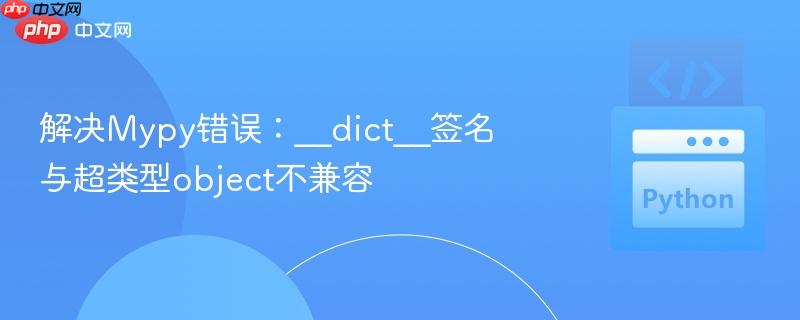
在Python中,将__dict__定义为方法而非属性会导致Mypy报告类型不兼容错误。本文深入解析了__dict__作为object超类型属性的本质,并提供了两种解决方案:一种是将其改造为带有setter的属性以直接解决Mypy报错,另一种是推荐使用独立的to_dict()方法进行对象序列化,以遵循更佳的Pythonic实践并避免内部属性冲突。
当你在Python类中定义一个名为__dict__的方法时,静态类型检查工具Mypy可能会报告一个错误:Signature of "__dict__" incompatible with supertype "object"。这个错误提示表明你定义的__dict__方法与Python内置object类型所期望的__dict__签名不兼容。
其根本原因在于:
考虑以下导致MMypy错误的示例代码:
import json
from typing import List
class RepeatedValue:
def __init__(self, element: int, indexes: List[int]) -> None:
self.element: int = element
self.indexes: List[int] = indexes
# 错误地将__dict__定义为方法
def __dict__(self) -> dict:
return {"element": self.element, "indexes": self.indexes}
# ... 其他类和代码省略,但存在对RepeatedValue.__dict__的调用在这种情况下,Mypy会指出RepeatedValue类中__dict__的定义与它从object继承的__dict__属性不兼容。
如果你确实需要通过访问obj.__dict__来获取一个自定义的字典表示,并且希望Mypy不再报错,你可以将__dict__定义为一个@property。然而,这会引入新的Mypy警告,因为__dict__通常是可写的。为了解决这个问题,可以为该属性添加一个setter,并在其中抛出NotImplementedError。
import json
from typing import List
class RepeatedValue:
def __init__(self, element: int, indexes: List[int]) -> None:
self.element: int = element
self.indexes: List[int] = indexes
# 将__dict__定义为只读属性
@property
def __dict__(self) -> dict:
return {"element": self.element, "indexes": self.indexes}
# 添加一个setter,使其不再是“只读属性覆盖可写属性”
@__dict__.setter
def __dict__(self, value):
raise NotImplementedError("Cannot set __dict__ directly on RepeatedValue instance.")
class RepetitionEvaluator:
def __init__(self, unique_values: List[dict],
repeated_values: List['RepeatedValue']) -> None:
self.unique = unique_values
self.repeated = repeated_values
# ... 其他类和方法保持不变,但需要确保对RepeatedValue.__dict__的调用仍然有效
class RepetitionEvaluatorPascualinda:
def __init__(self):
self.withness = {}
self.unique_values: List[dict] = []
self.repeated_values: List[RepeatedValue] = [] # 修正类型提示,初始化为空列表
def _process_with_withness(self, numbers: List[int]) -> None:
self.withness.clear()
for index, value in enumerate(numbers):
if value in self.withness:
self.withness[value].append(index)
else:
self.withness[value] = [index]
print("Todos los numeros fueron procesados correctamente..")
def _process_unique(self) -> List[dict]:
return [{
index[0]: value
} for value, index in self.withness.items() if len(index) == 1]
def _process_repeated(self) -> List[RepeatedValue]:
return [
RepeatedValue(value, index) for value, index in self.withness.items()
if len(index) > 1
]
def evaluate(self, numbers: List[int], json_output: bool = False):
self._process_with_withness(numbers)
self.unique_values = self._process_unique()
self.repeated_values = self._process_repeated()
output = RepetitionEvaluator(self.unique_values, self.repeated_values)
if not json_output:
return output
# 使用自定义编码器处理序列化
return json.dumps(output, indent=2, default=lambda o: o.__dict__)
def main() -> None:
numbers = [0, 1, 2, 3, 0, 1, 2, 3, 4]
evaluator = RepetitionEvaluatorPascualinda()
print("object output:", evaluator.evaluate(numbers).repeated[0].__dict__)
print("JSON output:", evaluator.evaluate(numbers, True))
if (__name__) == "__main__":
main()这种方法虽然解决了Mypy的报错,但它通过劫持一个内置的Python属性来实现,可能不是最清晰或最Pythonic的实践。
更推荐的做法是,不要直接覆盖__dict__,而是为你的类提供一个专门的方法(例如to_dict()或_as_dict())来返回其字典表示,供序列化或其他用途。这样可以避免与Python内部机制的冲突,并提高代码的可读性和维护性。
import json
from typing import List, Any
class RepeatedValue:
def __init__(self, element: int, indexes: List[int]) -> None:
self.element: int = element
self.indexes: List[int] = indexes
# 提供一个专门的方法用于返回字典表示
def to_dict(self) -> dict:
return {"element": self.element, "indexes": self.indexes}
class RepetitionEvaluator:
def __init__(self, unique_values: List[dict],
repeated_values: List[RepeatedValue]) -> None:
self.unique = unique_values
self.repeated = repeated_values
class RepetitionEvaluatorPascualinda:
def __init__(self):
self.withness = {}
self.unique_values: List[dict] = []
self.repeated_values: List[RepeatedValue] = []
def _process_with_withness(self, numbers: List[int]) -> None:
self.withness.clear()
for index, value in enumerate(numbers):
if value in self.withness:
self.withness[value].append(index)
else:
self.withness[value] = [index]
print("Todos los numeros fueron procesados correctamente..")
def _process_unique(self) -> List[dict]:
return [{
index[0]: value
} for value, index in self.withness.items() if len(index) == 1]
def _process_repeated(self) -> List[RepeatedValue]:
return [
RepeatedValue(value, index) for value, index in self.withness.items()
if len(index) > 1
]
def evaluate(self, numbers: List[int], json_output: bool = False) -> Any:
self._process_with_withness(numbers)
self.unique_values = self._process_unique()
self.repeated_values = self._process_repeated()
output = RepetitionEvaluator(self.unique_values, self.repeated_values)
if not json_output:
return output
# 使用自定义编码器,调用对象的to_dict方法
return json.dumps(output, indent=2, default=lambda o: o.to_dict() if hasattr(o, 'to_dict') else o.__dict__)
def main() -> None:
numbers = [0, 1, 2, 3, 0, 1, 2, 3, 4]
evaluator = RepetitionEvaluatorPascualinda()
# 现在直接访问.to_dict()方法,而不是__dict__属性
print("object output:", evaluator.evaluate(numbers).repeated[0].to_dict())
print("JSON output:", evaluator.evaluate(numbers, True))
if (__name__) == "__main__":
main()在这个改进后的版本中:
通过遵循这些指导原则,你不仅能解决Mypy的类型不兼容错误,还能编写出更健壮、更易于维护的Python代码。
以上就是解决Mypy错误:__dict__签名与超类型object不兼容的详细内容,更多请关注php中文网其它相关文章!

每个人都需要一台速度更快、更稳定的 PC。随着时间的推移,垃圾文件、旧注册表数据和不必要的后台进程会占用资源并降低性能。幸运的是,许多工具可以让 Windows 保持平稳运行。

Copyright 2014-2025 https://www.php.cn/ All Rights Reserved | php.cn | 湘ICP备2023035733号